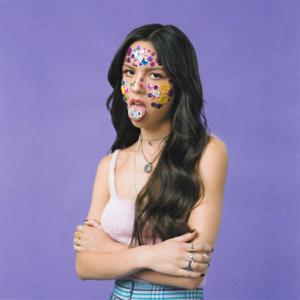
the luxury of bad art by Rona W. '23
nothing but the truth
Recently, I’ve been trying to record music. I have a mic setup thanks to the rap class I’m taking this semester with Lupe Fiasco; my living group has a piano keyboard, and I’ve downloaded MuseScore. It’s my first time approaching music as a creative outlet, and to be honest, I’m not very good—some of it comes from a lack of experience, but I also suspect I don’t have the voice to ever become better than a mediocre singer.
I became interested in songwriting after listening to Olivia Rodrigo’s Sour album and realizing how wonderfully she captured the pains of first love, first heartbreak, teenage insecurity. Her songs climbed the Billboard Hot 100 because they resonated with so many people, because they bridged the distance between souls in crisply-produced three-minute bundles.

sixteen-year-old me needed this album
Her music reminded me of what I’ve tried to do for a long time, with my writing, with my fiction, with this blog. Life is less lonely when somebody sees you. Feelings become more manageable when they exist somewhere outside of your own body. Identifying something universal within your own specific experiences—that feels like finding a lighthouse among dark churning waves.
In tenth grade, I entered a writing contest for the first time, with a short story I wrote over winter break. It was sarcastic and silly, and I infused it with observations that had plagued me for years, like how I felt trapped between the dichotomy of being a “girly-girl” and a “tomboy”, and how boys got to be multifaceted but girls were labeled one thing or another. It was very, very fun to write. The story ended up winning a national award, and I flew to New York City for the awards ceremony.
While there were many wonderful outcomes that arose from this experience—it was the first external, institutional validation I ever received for my writing, and it helped me later in college admissions—I think the most significant internal development was the sudden insight that I could talk about the stuff that bothered me. Starting from fourth or fifth grade, I felt like I’d been constricted by gender norms, by internalized misogyny, by other people’s expectations of who I was “supposed” to be—but I’d never really discussed my frustrations with anybody. Then I got to make up a story and give my problems to a fictional character.
That was years ago, and my relationship to creative writing has since become more complicated. I’ve been incredibly lucky in many ways—eternal gratitude to those who have believed in me and supported me even when life was rocky—but it was only after the (metaphorical) ink on the contract had dried that I realized being a professional writer is very different from being a hobbyist, from being a kid tapping out fanfiction at midnight. The expectations were stricter, the critics were more vicious, and the stakes were higher.
I don’t try to take my writing too seriously, which isn’t always easy. But I’ve found that when I become obsessive about crafting a beautiful phrase or vivid image, that’s often a sign of ego—and it’s necessary sometimes, but it can also get in the way of the reasons I began writing in the first place.
What if I want to be terrible and artless? What if I want to draw ridiculous comics featuring characters with unrealistic proportions and sloppy storylines? What if I want to record a pop melody that bashes a thinly-disguised ex and upload it to Soundcloud only to get two likes? I don’t want to commodify everything, and I don’t want to be good at everything. I don’t want to think about the invisible audience hovering behind my shoulder, casting a critical gaze upon anything I produce.
My songs may never be heard by anybody other than myself—I don’t know if I should inflict my singing upon others. I don’t know if I have anything innovative to contribute, and I don’t know if I want people to scrutinize my music. Last week, as I wrote lyrics, the thought floated through me—this is a waste of time since I have no real musical aspirations, I should do something that might actually further my career like my software engineering problem set or my systems design reading or even just reading a novel—but I wanted to capture what I was feeling in that moment before it faded. I wanted to preserve that version of Rona before she was lost to the merciless linearity of time. It felt like a song was the most honest conduit for her, and it didn’t matter if it was terrible.
Cross-posted on Substack here.